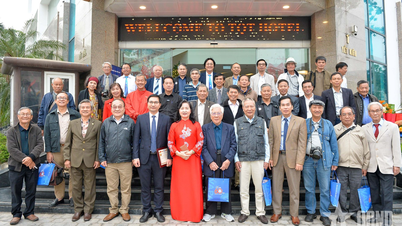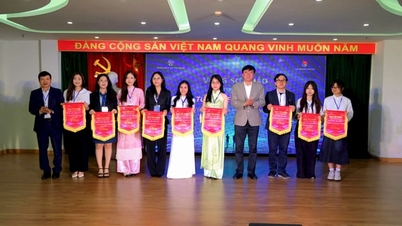In Vietnam, the digital transformation process is taking place strongly in all fields. Identifying, preserving and promoting national cultural identity in the digital environment is not only the task of state management agencies but also the responsibility of each individual in society.
The book “Identifying culture in digital space” co-edited by Associate Professor, Dr. Vu Trong Lam and Dr. Nguyen Viet Lam, published by the National Political Publishing House, Truth, aims to contribute to building a system of theoretical and practical issues on culture in digital space - a very new and complex content in the current context of digital transformation.

The book “Identifying Culture in Digital Space” consists of 4 chapters, starting with a clear explanation of the concept and basic characteristics of digital culture. Digital culture, as defined by the group of authors, is the entire method of creating, preserving, disseminating and receiving cultural values through digital technology platforms; at the same time, it is a set of rules, ethical standards and laws regulating human behavior in the digital environment.
Contents such as digital interaction culture, digital content creation culture, digital consumer culture, or digital ethical culture... are presented coherently and easily understood, helping readers grasp the overall picture of culture that is being reshaped under the impact of digital transformation. The group of authors not only focuses on theory but always puts these issues in the practical context of Vietnam, creating a connection between academic thinking and practical requirements.
In addition to shaping the theoretical basis, the book also shows its appeal in its comparative approach and broadening of vision, connecting with a number of countries in the world . In Chapter II, the group of authors delves into the policy and strategy of digital culture development in leading countries such as the European Union, the UK, Spain, and a number of other countries.
The book devotes chapter III to discussing factors affecting culture in the digital space, such as social media, the development of artificial intelligence, changes in personal lifestyles and consequences such as value crisis, privacy infringement, or moral degradation in the virtual environment... These contents are not only theoretical but also closely related to prominent issues in today's society, from the trend of idolization on social networks to the spread of false information, deviant language and deviant digital ethics. This helps readers, especially the younger generation, to have a deeper and clearer awareness of their cultural responsibilities when participating in the digital space.
Chapter 4 has high practical value when the authors focus on the current state of digital culture development in Vietnam and propose a comprehensive system of solutions. Based on Ho Chi Minh's thought on the role of culture in national development, along with the viewpoints and policies of the Party and the State, the book affirms that Vietnam has made significant progress in building digital culture such as digitizing intangible cultural heritages, developing a national cultural database, applying technology in cultural and artistic education ... However, there are still major challenges.
The authors propose a series of practical and highly feasible solutions, from perfecting the legal framework, enhancing digital culture education, developing domestic digital platforms, to encouraging the creation of digital content with Vietnamese identity. Notably, the emphasis is on the role of digital citizens, who are both beneficiaries and creators in the digital space, who need to be trained, guided, and supported to effectively promote the strength of national culture in the new era.
“Identifying Culture in Digital Space” is a highly topical publication that both explores theoretical foundations and provides incisive practical analysis and suggests many possible directions for the future.
Source: https://hanoimoi.vn/nhan-dien-van-hoa-trong-khong-gian-so-710198.html


![[Photo] National Assembly Chairman Tran Thanh Man attends the VinFuture 2025 Award Ceremony](/_next/image?url=https%3A%2F%2Fvphoto.vietnam.vn%2Fthumb%2F1200x675%2Fvietnam%2Fresource%2FIMAGE%2F2025%2F12%2F05%2F1764951162416_2628509768338816493-6995-jpg.webp&w=3840&q=75)




![[Photo] 60th Anniversary of the Founding of the Vietnam Association of Photographic Artists](/_next/image?url=https%3A%2F%2Fvphoto.vietnam.vn%2Fthumb%2F1200x675%2Fvietnam%2Fresource%2FIMAGE%2F2025%2F12%2F05%2F1764935864512_a1-bnd-0841-9740-jpg.webp&w=3840&q=75)









































































































Comment (0)